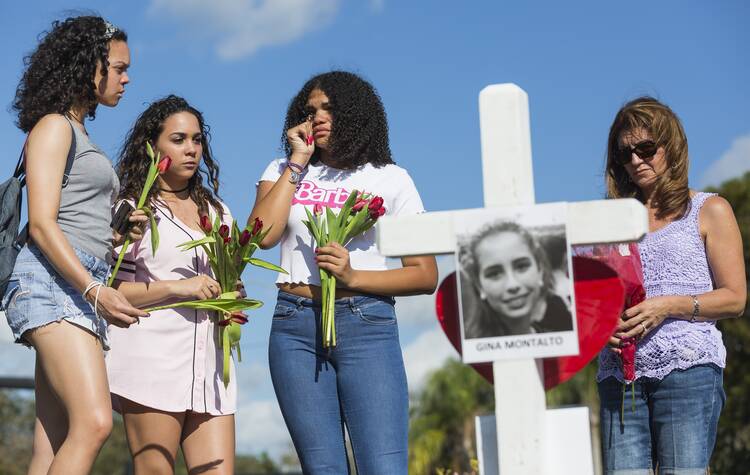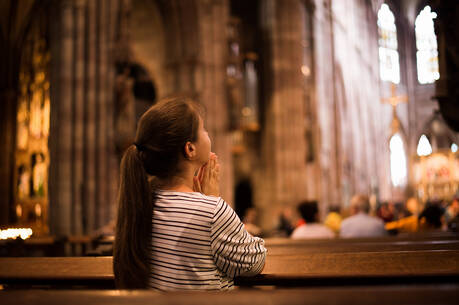We have grown up listening to sacred Scripture in church, and, of course, we call it sacred Scripture. So none of us is going to argue with it. Most people presume that, true or not, it contains some moral or insight that is still useful to us. One might call this approach “the tweets from God hidden in the weird old story” way of reading and hearing scripture. It reduces Scripture to an ancient story from which we draw lessons. But if that’s all sacred Scripture is, why not use other stories as well?
The church knows that her stories and sayings are old. She understands that they took root in cultures that are quite different from our own. Yet we receive the Scriptures as God still speaking to us, to our current situation. Think about it. Times have changed a lot; people, not all that much. Each passage of Scripture is read by us in the light of Christ, which connects it to all other passages and to the church’s own growth in time.
We receive the Scriptures as God still speaking to us, to our current situation. Times have changed a lot; people, not all that much.
Admittedly, the story of Abraham, ready to sacrifice his son Isaac, seems to stand apart from any reasonable approach to Scripture. It does not even conform to the God whom we know from the rest of the Scriptures. Here God is not simply mysterious; he appears positively malign. And adding exegetical background does not add sense to the story. It makes it even more sinister.
Consider that:
- Abraham has no concept of an afterlife. So he is not, in his mind, sending his son “to be with the angels,” as we like to say. He believes that his son will descend into utter darkness, from which there is no return.
- For the ancients, all divine blessings were in this life. There was no other life. So it is inconceivable for them to find any consolation by accepting something negative in this world for the sake of a world to come.
- For a primitive nomad to sacrifice his son was to immolate his own future. The prosperity of the family was completely dependent upon procreation. So Abraham is not simply sacrificing his family name. At the command of his God, he’s forfeiting his family’s future.
Hard to find a divine tweet here! The story is not preaching diversity, inclusiveness, acceptance, tolerance or any of the other contemporary themes, which we have now decided are divine. Note, I am not saying that these human values are not of God. Only pointing out how the values found in Scripture shift as the readers rotate. If Scripture is nothing more than an old story illustrating a current value, be assured, the values will be restless.
Abraham’s God filled his life with blessings. And then God demanded that all this be sacrificed. Does that speak to us?
So what does the church make of this troubling tale, receiving it, as she does, in the light of her long listening? First, it is ever ancient and ever new. Abraham’s God filled his life with blessings, even the unmerited, unexpected blessing of a first-born son. And then God demanded that all this be sacrificed. Does that speak to us? Does that still happen?
Parkland, Fla., is something of an American promised land. The New York Times reported that “Parkland is the type of community where affluent young parents move to find verdant parks and pristine sidewalks for their children. Most everybody knows somebody at Stoneman Douglas High, home of the Eagles.” The report continued:
State Representative Jared Moskowitz, who graduated from M.S.D. in 1999, sends his 4-year-old to a preschool down the street. “It’s surreal,” Mr. Moskowitz said. “People don’t come to Parkland to open a business. They come to Parkland to raise a family. They come to Parkland to send their child to an A-rated school. They come to Parkland to live in the safest community in the county.”
So the notion of one’s deity or, in this case, the American dream suddenly turning upon you is ever new, even if you would prefer it to be the stuff of ancient legend.
The father of one of the victims, 18-year-old Meadow Pollack, asked: “How does this happen to my beautiful, smart, loving daughter? She is everything. If we could learn one thing from this tragedy, it’s that our everythings are not safe when we send them to school.”
In answer, those ready to speak of young ones being now among the angels immediately made their appearance in Parkland. But the father of another victim, Fred Guttenberg, was more realistically righteous in admitting, “What is unfathomable is, Jamie took a bullet and is dead. I don’t know what I do next. My wife is home. We are broken.”
What can the church and her Scriptures say to those who are broken?
What can the church and her Scriptures say to those who are broken? In the light of the resurrection, the early church reread her sacred Scriptures, which, at that time, were only the Hebrew texts. She had not yet composed the New Testament. Suddenly, almost everything within them took on a new meaning, especially this story of Abraham, ready to sacrifice his son to God.
The transfiguration is an equally difficult story to decipher, at least if your question is, “What would a video camera have seen?” But the early church saw it as revealing the deepest truth about Jesus, the Nazaren who was crucified. This was not simply the death of an innocent, another ever-ancient, ever-new story. Nor was it simply the murder of a prophet. Only in the light of Christ, come into the world—here revealed in the transfiguration—could the early church understand that God had done in Jesus what he could not bring himself to ask of Abraham: the sacrifice of self, the sacrifice of the Son.
If God is for us, who can be against us?
He who did not spare his own Son
but handed him over for us all,
how will he not also give us everything else along with him? (Rom 8: 31-32).
Resurrection radically reconfigures the meaning of Christ’s death, but it doesn’t cancel the fact that at the moment of his death Jesus, the Son of God, in an act of human faith, went down into utter darkness, not knowing what the Father would have of him.
The church has no interest in finding tweetable truths in the near-sacrifice of Isaac. She can only comprehend the meaning of his would-be murder in the cross of Christ: What God would not ask of us, God has asked of self. On Calvary the Father turns his face from Jesus, because the Son’s mission is to take the place of sin, which is abhorrent to God. Perhaps also, he looks away because his heart breaks, though how we are to understand that divine emptying, no one can say. All that unites Father and Son in this utter darkness is the silent balm of the Spirit. Yet from this, all things new will spring.
God does not stand above us, demanding sacrifice, lest evil fall upon us. God sacrifices self to carry us out of evil. Sadly, for Parkland and for all of us, we still live in the between-times. But we are not without hope. God’s gift of self, God’s sacrifice, will have its effect. It cannot be thwarted. But first it attends our own.
Readings: Genesis 22:1-2, 9a, 10-13, 15-18 Romans 8:31b-34 Mark 9:2-10











"On Calvary the Father turns his face from Jesus, ......."
So where was God during the shooting? I say he was standing back watching man destroy themselves. I really find no use or comfort in the trite old responses that Christ was with the dying or guiding the survivors out of the building. Those platitudes are wasted on the dead and an embarrassment to the survivors. Where is God in all of this?
As an imperfect Catholic, I do believe that God is with us even when He seems distant. I have attempted suicide several times due to depression because I'm gay. Many years ago I had sex with men, acts which I regretted and sought and received forgiveness and consolation through the Sacrament of Reconciliation from a compassionate priest. As a Special Education teacher, I taught children with brain damage as well as many with physical disabilities. It was admittedly difficult at times, but I was fortunate that those children brought much happiness and satisfaction to me and to their loving parents. I agree that many Americans "worship" guns instead of worshipping God and loving Him and our neighbors. When my Dad passed away in 1994, I discovered in his bank safety deposit box a handgun. I immediately turned the gun into the local police department. While I certainly support stringent gun control laws, I also believe that it may be worthwhile for police departments to encourage gun owners to turn in their weapons and receive payment for the gun(s). According to a recent article in the Washington Post, the school shooter, Nikolas Cruz, had been diagnosed as having autism. While he was enrolled for a time in a school which educates children with special needs, he had spent most of his school years in schools with students who weren't disabled, and with no doubt good, caring teachers who had no experience in teaching disabled students. The youthful Mr. Cruz was certainly troubled, and I believe it would have been best if he had been educated in a "special" school . Finally, although I absolutely don't pretend to understand all that God does, I do believe that God loves us, and that He was willing to have His Son Jesus die for our sins. Unlike Abraham, who had no belief in an afterlife, as someone who once doubted His existence because of seeing so much suffering in the world, I do now believe that "God's gift of self, God's sacrifice, will have its effect." This may be dismissed as being trite, but I do believe that both by prayer and work to change our gun laws, that, with God's help, we can transform our society into one that respects human life.
I find it hard to connect the story of Abraham preparing to sacrifice Isaac with the Parkland school shooting. The first is a mysterious story of God, the second is the outcome of stupidity and idol worship. We worship guns and the money that can be raised from worshipping them. Dead children are collateral damage to be written off and later ignored. School shootings are the consequence of the sins of the adults in this country who refuse to put reasonable controls on guns, the organizations that promote guns, and the politicians who refuse to act for the common good.
Listening to this reading yesterday made me think of how much violence there is in the Bible. It also made me wonder how this story would be rendered if God were imagined as Mother and Isaac as Daughter.